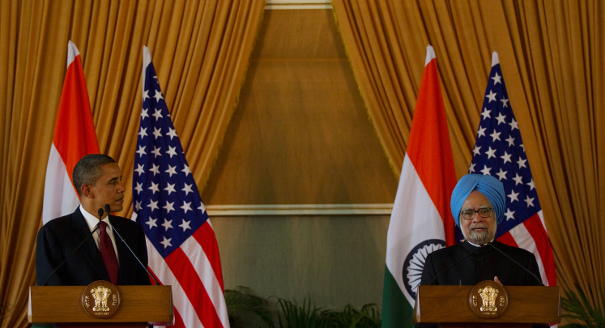On the eve of Indian Prime Minister Manmohan Singh’s first state visit to Washington since Barack Obama took office, the United States and India must agree on three vital security issues to ensure that their relations continue to deepen: terrorism, Kashmir, and the balance of power in Asia.
U.S.–India relations are off to a strong start under President Obama following an unprecedented strengthening during the Bush administration. Secretary of State Hillary Clinton scored high points on her visit to India in July, emphasizing economic and social development, and making a number of symbolic gestures to reaffirm India’s importance to the Obama administration. But relations can only advance so far unless India is assured of U.S. support on its major security challenges.
Key Conclusions:
- Terrorism: Pakistan uses U.S. counterterrorism aid to combat terrorists who threaten mainly its own security, ignoring those who target Afghanistan and India. India—and the Indian public, especially—is increasingly frustrated that Washington’s policy has failed to show results. The United States must cooperate with India in addressing this challenge, and redouble its efforts to ensure the cooperation of the Pakistani military.
- Kashmir: The Bush administration’s hands-off approach on Kashmir was critical to bringing both sides to the negotiating table with realistic expectations. Talk of intervention by the Obama administration could deepen Pakistani recalcitrance, disrupt U.S.–India relations, and set back the peace process.
- Regional balance of power: The regional balance of power is critical to sustaining India’s current nuclear posture and deterrent capabilities. A private, high-level dialogue between India and the United States would assure New Delhi that Washington values a balanced regional approach—and that U.S. financial dependence on China will not unduly limit the necessity for preserving the appropriate strategic balance in Asia.
“Prime Minister Manmohan Singh’s forthcoming state visit to Washington offers the Obama administration a splendid opportunity to engage on these issues, and also on the U.S. priorities of climate change, nonproliferation, and economic and defense cooperation,” writes Tellis. “The success and durability of the partnership between India and the United States will depend on it.”





